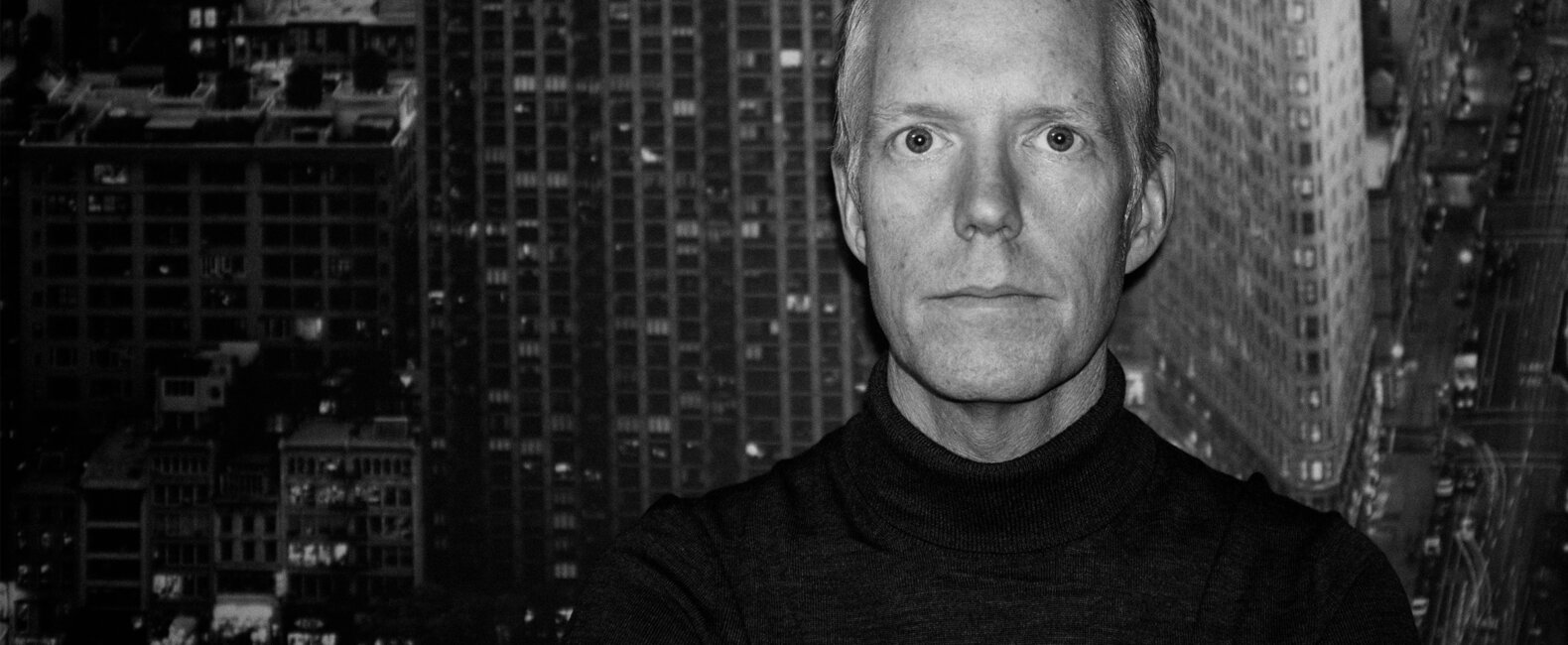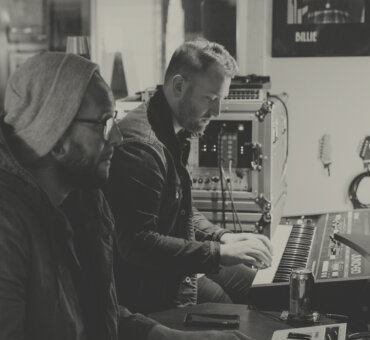It takes guts to try something new. It takes even more guts to invent something new. This discomfort seems to be pianist Chad Lawson’s new comfort zone, however. Historically, he’s excelled at reinvention. The virtuoso pianist and composer started his career with traditional jazz, then decided to make music on his own terms — the result being a strikingly minimal, delicate style that he’s become renowned for. On his latest album, re:piano, Chad decided to take it a step further by incorporating electronic loops and ambient sound into the production, while maintaining the piano as the album’s sole instrument. The new sound is somewhere in between classical, ambient, and, well, Chad Lawson. Ultimately, the genre seems to be irrelevant: “Let’s get rid of the idea that music has to fit into this certain box, and just enjoy whatever it is,” Chad told us.
His philosophy seems to be paying off. The new album peaked at number one on the iTunes Classical charts and number five on the Billboard Classical charts, as well as garnered the attention of NPR’s Weekend Edition (you can listen to the interview here).
We caught up with Chad in Istanbul during a stop on a European tour in support of his latest album. Perennially thoughtful, Chad had insight on the processes behind his latest album, what it’s like to reinvent a genre, and why he still takes piano lessons after 38 years behind the keys. Here’s our good friend, Musicbed composer, and genre-defying artist Chad Lawson.
Musicbed: How’s the response been in Istanbul?
Chad Lawson: Oddly enough, Istanbul is my largest Spotify listening audience, which is so bizarre to me. It’s my number one listening city in the world, not just an area across the pond, but anywhere. Most shows have been sold out for about a week now, and there’s a large number of magazines and blogs that have done interviews.
It’s kind of surreal for me, because I really don’t have the ego for this, to be honest. I’m a behind-the-scenes person. I’m not a limelight kind of guy, so when you have CNN Turkey writing about your upcoming shows, I’m not always sure what to think about it. But, I look at my career like a three-legged stool. One of those legs is streaming services, the second is licensing, and the third leg of the stool is live performance. I need all three running at once just in case one side starts to get a little wobbly. Truth be told, of the legs on this stool, touring is the one I would put in third place, just because it keeps me from home. This is a three-week trip. I’m missing Easter, my wife’s birthday, spring break. But I am seeing a good response. The album is number two on iTunes U.K., went to number one on iTunes U.S., and it just went to number five on the Billboard Classical charts. So these things do add up.
Is it rewarding to see an audience’s reaction to your music in person?
Very much so. As a composer, it’s something we don’t always think about. We just sit down at our instruments, strum up some chords, write some melodies, but once it’s recorded we tend to forget about it. The other day, I was doing a show in Belgium and a girl came up to me; she must have been 22 or 23, and her eyes were beet red. She had been crying the entire time. She said, “I had to find you after the show. I just wanted you to know that your music has gotten me through some incredible difficult times. I just couldn’t stop crying during the show.” At that point you realize there’s a lot more to this than going to the studio and writing some music. You’re really touching people. There’s a giant disconnect for composers, because, in some degree, we are so introverted that we can’t imagine that conversation actually happening. I get emails all the time. There was a guy who was a cyclist out in California and he got run over by a car. He said, “I’ve been in the hospital for eight months and your music is the only thing that lets me sleep.” That’s really heavy.
Does piano communicate differently than other forms of music? An indie-rock band may not get that kind of reaction.
That’s a great question. I love that. It really depends on the mood of the listener and where they are in their life or their week. If you look at my stats on Spotify, for instance, during the week my numbers are really high, but come Friday night, they just plummet.
They’re not exactly party anthems.
Exactly, exactly [laughs]. I’m totally OK with that. I saw a Tweet the other day about the new album and someone said, “I’ve listened to it 15 times in a row while I was working. It’s my focus album.” I love that it’s able to get you to a place where you can just tune out the world. We have so many things pulling at us every day — be it 140 characters or any kind of notification. My music is meant to say, “Hey, it’s cool to take a breath, to sit for a second.” I really want that. I want them to not drive with it on because they’re afraid they’re going to fall asleep. I want there to be this calm, almost healing quality to it.
That seems directly reflected in re:piano, right?
With this new album I just wanted to create something different. I wanted to see what we could do with piano. It’s been around for a long time. Let’s give it a new face, put some fresh paint on it. I’ve honestly never heard anyone doing something like this before — looping piano or anything like that. Truth be told, I see a lot of iPads on stages and not so many pianos. I’m trying to let a younger audience know that pianos are still cool. It’s a matter of being curious and seeing what you can do with them.
So what’s your starting point with this new process?
I’m glad you brought that up. Normally when I write an album, I write down a chord and then write something else over it. I love a melody. That’s my favorite thing about music; I’m a melody man. But, I wanted to take a step back and create more of an atmosphere, something that revolves around sound, textures, and looping. You really can’t do that by starting with a melody. So, I decided to find one sound to start each song with. For instance, the very first song I recorded, “Tell Me a Story,” I just started by playing two notes. A G and a C. That’s really how the entire album came into being, and I just started adding layers on top of that.
One of my favorite parts of the album is that it’s really out of character for me. Normally when you hear my stuff, you think, oh, that’s Chad. But, this is not like anything I’ve ever done before. I’m constantly just trying to push myself. I’m 43 years old and I’ve been playing since I was five and I still take lessons. This chapter was all about trying to push myself into something I’ve never done before.
You still take lessons?
Yeah. I still study with the guy I used to study with in New York, Garry Dial. It’s bebop jazz for the most part. That may sound bizarre, but I do it because it gives me color. It’s not something that I directly pull into my playing — you won’t hear me doing any jazz at all on my albums, but there are elements of it in color and improvisation. There are times when I think, man, I’m not hearing color anymore. That’s when I go back and start working on that stuff again. It’s just like reading books. You get into people’s lives when you read books and experience things you would never experience in your own life. I find that Garry’s constantly presenting things to me that I’ve never heard or maybe that I’ve overlooked. I need that to make me a stronger pianist, a stronger composer. I’ll take lessons until the day I die.
Was the electronic process on re:piano hard to recreate in a live setting?
Truth be told, the first two shows were train wrecks, or at least I thought they were. But it was mainly a result of just dialing in the electronics. The problem is that if someone coughs or clinks a glass, it gets into the loop. I’m just waiting for someone to catch on and yell something obscene from the audience so they can hear it repeated over and over again [laughs].
But, within the past three weeks I’ve been really happy. And the response has just been insane, which blows my mind. I didn’t know how well this would go over live. It’s passive, so chill, that I thought people would just be bored to tears. People are hearing textures that’s they’ve never heard with piano before, and it’s going really well.
Have you gotten any pushback from traditionalists?
There’s one troll that just hates me on iTunes for some reason, but he’s just one guy. I think the reason is that it’s really difficult to define genres anymore. Not just this genre, either. I mean, look at folk or Americana. Is it country? Is it folk? Is it just acoustic music? I think this person is just having a hard time and he’s angry that my album is being called classical. His point being, my album is not Beethoven or Bach, how dare you call this classical music? But I think he’s part of a generation that’s used to classical being more traditional. This next generation of composers and performers, to us, this is classical. This is where we are taking classical music. Otherwise, it’s going to die.
It seems like you’re just fine with that genre ambiguity.
Take Adele, right. Everyone loves Adele. Imagine you’re in line getting coffee and the girl behind you is listening to her earbuds, singing Adele without even realizing she’s doing it. She could probably care less what genre Adele is, but she knows every lyric to her songs. It’s the same thing with classical music. You could go to someone and say, “You know that Jóhann Jóhannsson stuff? That Max Richter stuff? Well, that’s classical.” Their response would be, “OK, so? I don’t really care what it’s called.”
I think streaming services have changed everything. If you’re listening to something you either give it a thumbs up or a thumbs down and you move on, unapologetically. That’s an amazing tool. It’s a powerful tool. Let’s get rid of the idea that music has to fit into this certain box, and just enjoy whatever it is. The point is, if you are able to take away any kind of prejudice from listening to music, then that’s the best thing that could happen for any artist, regardless of what instrument they’re playing.
Chad Lawson’s new album, re:piano, is now available to license on Musicbed. To listen to the full album, or to explore more of his work, check out his profile.























































































